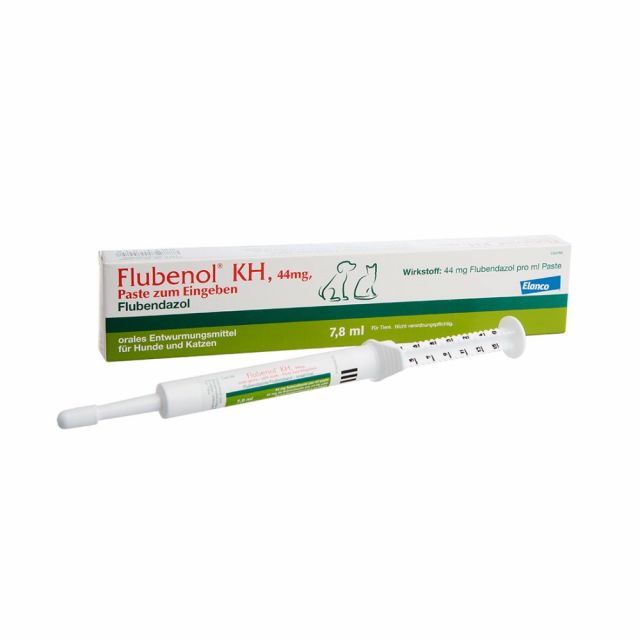Flubenol
With Flubenol paste, you can deworm your puppy or kitten, or your adult dog or cat, in a practical way. For many pet owners, administering a tablet is more difficult than giving a paste. Moreover, Flubenol paste is effective against the most common types of worms in dogs and cats.
The effect of Flubenol paste
The active ingredient in Flubenol is flubendazole (44 mg/ml paste). One injector contains 7.8 ml of deworming paste.
Flubenol for dogs
Flubenol works in dogs against the most common roundworms, whipworms, hookworms, and tapeworms.
Flubenol for cats
Flubenol works in cats against the most common roundworms, hookworms, and tapeworms.
Dosage and administration of Flubenol paste
Flubenol paste is for oral administration. Instructions for use and administration:
- Roundworm and hookworm infections: 22 mg (=0.5 ml) flubendazole per kg of body weight per day, for 2 days.
- Other types of worms: 22 mg (=0.5 ml) flubendazole per kg of body weight per day, for 3 days.
The paste has a handy scale indicating kg of body weight. For easy administration, turn the ring counterclockwise to the mark that corresponds to your animal's body weight. Administer this amount. For the next treatment, add the animal's body weight to the number where the adjustable ring was previously set, and set the ring to the new position.
For more information, see the package leaflet of Flubenol Paste 44 mg/ml.
How often should dogs and cats be dewormed?
The ESCCAP (European Scientific Counsel Companion Animal Parasites) advises deworming adult dogs and cats on average 2 to 4 times per year, depending on their living environment. Want to learn more about the right approach? We're happy to tell you more about deworming your adult dog or deworming your adult cat.
For deworming young animals, a different schedule applies. The deworming advice for puppies is to deworm at the age of 2, 4, 6, and 8 weeks, and then every month until they are six months old. The deworming advice for kittens is to deworm at the age of 3, 5, and 7 weeks, and then every month until they are six months old.
Medicines and supplements alongside Flubenol paste
If you live in or travel to an area where the Echinococcus tapeworm or heartworm is present, another deworming product such as Milbenin or Milpro may be necessary.
Worms are internal parasites. Dogs and cats can also suffer from external parasites such as fleas, ticks, mites, and sand flies. Some tapeworms use fleas as intermediate hosts, so flea and worm infestations often occur simultaneously. A good product against fleas such as Adtab or Advantage helps keep your cat or dog flea-free. We’re happy to tell you more about protection against fleas and creepy crawlies in dogs and protection against fleas and creepy crawlies in cats.
Very often, a worm infestation causes no symptoms. Sometimes, however, it leads to diarrhea or other gastrointestinal complaints such as vomiting. In addition to deworming with Flubenol paste, you can support your dog or cat’s digestive system with probiotics such as Protexin Pro-Kolin Advanced, Purina Pro Plan FortiFlora Dog, or FortiFlora Cat. Water-binding psyllium fibers in Iso-Gel help to firm up the stool.
If you have a question about Flubenol paste or deworming your dog or cat, please contact us.

